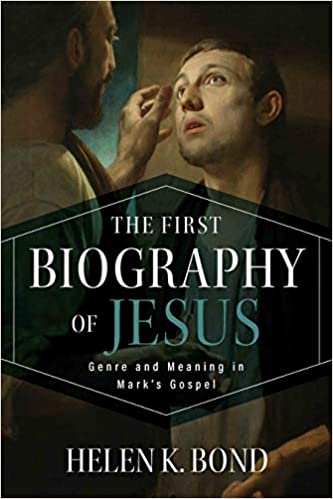BEN: Another thing that is obvious early on in your study is that ancient biographies tended to have ethical aims of forming character, promoting virtues and prohibiting vices, and unless I’m mistaken you see Mark’s Gospel as also an attempt at that sort of identity and character formation. Right? But what kind of identity formation and how does the theological content and the uniqueness of Jesus fit into such an aim?
HELEN:
Yes, I think identity and character are very much intertwined in Mark’s description of Jesus. As episode follows episode, we learn not only that he’s God’s adopted Son and anointed one but also something of his character traits – at first, he’s a manly man who bests opponents in the public sphere, who shows human kindness and benevolence to all, a great benefactor, someone who scores well against ‘King’ Herod and even Moses of old. But as he starts to journey towards Jerusalem and his fate, we learn that his teaching involves self-denial and obedience, humility and restraint, courage and steadfastness under trial. Not all of these would necessarily be virtues in Roman eyes (Mark’s view of honor would be especially odd), but they are virtues that Mark calls on his audience to emulate as they seek to ‘follow’ Jesus.
I’m glad you’ve asked about the uniqueness thing, because it’s something that all ancient biographers wrestle with to some extent. On one hand, biographies are monuments to great people (usually men), but on the other hand they are nearly always written to encourage others to emulate them. So there’s always a pull between emphasizing the uniqueness of your subject (that’s why you are writing a bios in the first place!) and the presentation of traits for others to follow. The audience aren’t expected to do exactly what the heroes do (they aren’t called to fight wars, rule over nations, or teach philosophy to Indians) but to discern the virtues exhibited by the heroes as they live their lives. So Mark’s audience clearly won’t have Jesus’ great powers to do miraculous works, but they can learn from his kindness and willingness to engage with even the grubbiest most annoying beggar, his unwavering devotion to God’s will, or his courage under trial.
The bios does have ‘theological content’, of course, but much of it stems from Mark’s Jewish heritage and his concept of the God of Israel’s plan for humanity as expressed through the Scriptures, rather than what we might call the ‘person and uniqueness’ of Jesus (which I would see as a rather later development). Mark does have a Christology, and he does have some sort of theology of the cross, but none of this stands in the way of presenting the life of Jesus as a model for others. (The frequent call to ‘follow’ Jesus, along with the structure of the work in which Jesus follows John and is himself followed by others – see chapter 13 especially – underlines the motif of imitation). It’s also the case that many bioi take divine figures as their subjects – not only Suetonius’ emperors, but Philostratus’ Apollonius, Philo’s Moses and plenty of others. It’s not clear to me exactly how Mark understood the relationship between Jesus and the God of Israel – Jesus is clearly God’s adopted Son in a way that his followers will never be, though devoting their lives to him allows them to become Jesus’ brothers and sisters. I tend to think that the ‘higher’ the Christology the more difficult imitation becomes – in John’s Gospel, for example, it’s very difficult to imagine Jesus as a model, hence the need for the Beloved Disciple to step in as an idealized disciple.












